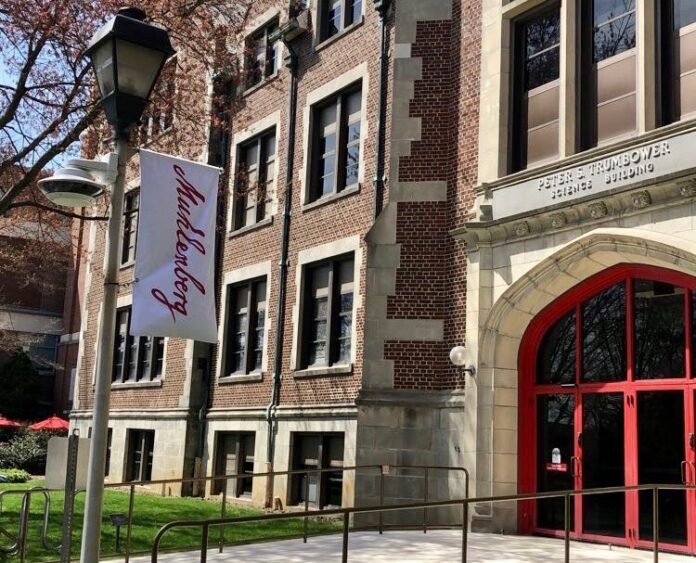Following national news coverage on racial inequality, many students are actively speaking out against instances of discrimination taking place across the country and within the Muhlenberg community. These voices continue to share their personal experiences, demanding that conversations about institutional racism be put into action by peers, faculty, staff and the College as a whole.
On Aug. 14, an anonymous posting on the ‘Berg Student Action page on Instagram expressed outrage that “Thin Blue Line” masks were for sale in the ‘Berg Bookstore. The masks featured a black-and-white American flag with a blue stripe, which has become a symbol of the countermovement to Black Lives Matter. An Aug. 16 email from The Student Government Association (SGA) expressed concern over the sale of the masks, saying that they had been removed from the bookstore, which was reiterated in an Aug. 19 communication from Muhlenberg’s Chief Business Officer & Treasurer Kent Dyer. The masks were then taken down after the intervention of the office of multicultural life and administration; however the news was met with indignation, and students responded by creating and signing a petition addressed to the College.
“I am curious how a campus that states it recognizes the struggle of minorities in this country can also sell masks that support groups that actively oppose social justice movements such as ‘Black Lives Matter,’” reads part of the petition. “How are Muhlenberg’s POC students supposed to feel safe and welcomed on campus when their own bookstore does not reflect that belief?…we students feel the sale of this item threatens equality for all Muhlenberg students, regardless of race or ethnicity.”
On Sept. 04, President Kathleen Harring sent an email to address any confusion surrounding the series of events.
“We were faced with two issues when dealing with the face masks in question, one policy-related and the other values-focused. The College’s practice is to not sell merchandise that supports political or social causes,” stated Harring.
“We believe profiting from any cause would be against our basic values to respect differing viewpoints and constructive discussion,” said Harring. “That is why the bookstore was instructed to remove ‘Thin Blue Line’ face masks once we learned they were being sold. And it’s important to note other cause-related face masks, such as those for Black Lives Matter, have not been sold in the bookstore.”
SGA has issued several statements regarding the racial incident on campus and their commitment to being advocates for all Muhlenberg students.
“In our conversations with students, we have seen extreme hurt, disappointment and mistrust. Black and Brown students have been ignored for far too long, and it is the responsibility of SGA’s Committee of Diversity, Equity and Inclusion to prevent these issues from happening again,” said Danica Schofer ‘22, SGA chair of diversity, equity and inclusion.
“Our [SGA’s] priorities are ensuring a diverse committee of students to oversee the purchase of merchandise, creating rules to prevent political merchandise being sold from the bookstore or similar entities on campus, creating DEI guidelines for all vendors who interact with the campus and working toward enhanced training and education for administration, faculty, staff and students,” Schofer explained.
In addition to the ‘Berg Bookstore’s selling of “Thin Blue Line” masks, the ‘Berg Student Action account also brought attention to a mistake made in the 2020 Ciarla yearbook, in which the same picture was used for two different faculty members of color.
On Aug. 16, SGA sent an email to the student body, asking for feedback on their mask response and Ciarla funding. Traditionally, SGA contributes $10,000 per semester to the Ciarla yearbook; however, questions were raised as to whether or not full funding is necessary.
In a separate statement, Student Body President Jordan Soffer ‘21 explained that given the virtual nature of the semester for most students, the student activities fee ad-hoc committee conducted a necessary budget review in order to accommodate the nearly 650 students currently on campus.
“After lots of discussion and student feedback, this committee has decided to not provide any funding for the Yearbook this fall semester. This choice was directly impacted by students voicing their opinions in surveys sent out,” said Soffer.
“Given the semester being virtual for the majority of students, the Student Activities Fee Ad-Hoc Committee believed that the content of the yearbook would not be able to fully grasp the aspects of Muhlenberg and student life as it normally would,” said Soffer. “For example, students will not be taking photos of on-campus activities since almost all are virtual and with the seniors being the largest users of the yearbook, they will not feel represented and connected.”
Instead, the funding will be distributed to other projects and organizations.
“…The student body plans to reserve a certain percentage of their allocated budget to dedicate towards student initiatives that amplify marginalized students’ voices and promote diversity, equity and inclusion,” explained Soffer.























Great job with this article!